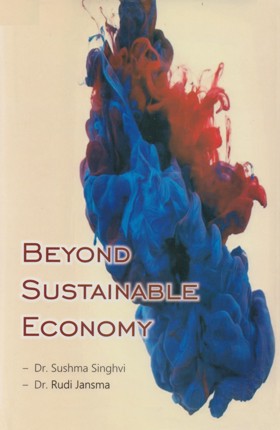Philosophy
Inanimate matter and animate consciousness give rise to share an inseparably intimate and intricate relationship. One of the paradoxical elements of this relationship is the habitual tendency of the mind to find comfort in hoarding both material objects and materialistic thoughts. Mind, when left to itself, might like to flow freely. However matter, the playground of the exploratory mind, seems to entice the latter to fall into traps of hoarding which act as brakes on its movement. This phenomenon has profound consequences for a healthy homeostasis of our world. Parigraha, which connotes hoarding, could originate from the movement of a satellite like the moon around its planet (i.e. 'graha'), e.g. the Earth. The movement of the Earth around the Sun is yet another instance of parigraha. And the moon is tied to the Earth which in turn is tied to the Sun through the bondage of parigraha. It is parigraha, the act of hoarding which sows the seeds of 'purvagraha' or prejudice in the fertile landscape of the mind.
Psychology
The notion "This that I collect in material things and thought is mine and is right" is the cause of immense misery and turmoil in the world. There is the famous story of a king who declared that he was sick. However when the best physicians could not diagnose the king's illness, a wise man was called to suggest how the king could regain his health. The wise man examined the king and prescribed that the king would become alright if he were to wear the shirt of a person whose happiness has no bounds. So the king's men went everywhere to find a man who is happiness was unlimited. After many disappointments, when they finally spotted a man who said he was indeed fully happy, the king's men asked him for his shirt. To this the man answered "But I have no shirt." When the ailing king heard what had transpired, he became healthy and happy for he had realized that parigraha brings sorrow while aparigraha is the mantra for eternal joy. The cause for parigraha mediating sorrow is paradoxical and therefore worth investigating. The sight of inflicting pain on someone is well known to disturb the spectator even if he or she is not the direct recipient of the painful experience. The eminent neurobiologist V. Ramachandran suggests that this is evidence to suggest that while globalization and the internet are thought to bring us closer, humankind is already and inherently interconnected being in a biological sense. So a hoarder suffers sorrow since what has been hoarded by him is the cause of misery among those who suffer from deprivation and poverty. Since most people think that wealth and hoarding bring happiness, it is worth noting that http://www.ocfoundation.org/hoarding/ is a website devoted to the problems and pathologies associated with hoarding disorders. Hoarding can be quite debilitating, because when someone's whole life is based on hoarding, family relations have been found to be strained. It is quite common to read about a fire in a home that was so cluttered that firemen couldn't get through the door. This creates a situation where even the neighbors of the hoarders can be put at risk. Hoarding is defined as the acquisition of and inability to discard items, even though they appear to have no value.
Medical aspects
Hoarding behavior has been observed in several neuropsychiatric disorders, including schizophrenia, dementia, eating disorders, autism, and mental retardation, as well as in non-clinical populations, but it is most commonly found in Obsessive Compulsive Disease (30% to 40% of OCD patients report hoarding and saving as symptoms), and about 10% to 15% have hoarding as their most prominent symptom factor. Compulsive hoarding is most commonly driven by obsessional fears of losing important items of which the patient believes will be needed later, distorted beliefs about the importance of possessions, excessive acquisition, and exaggerated emotional attachments to possessions.
 Dinkar Sahal
Dinkar Sahal
 Dr. Rudi Jansma
Dr. Rudi Jansma
